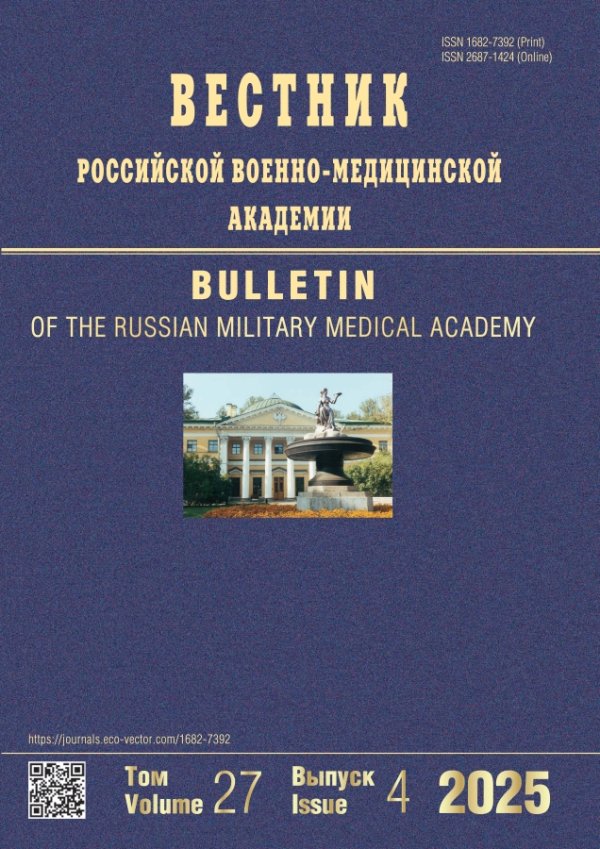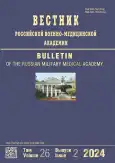The need for and prospects of developing a modern mobile laboratory complex for equipping sanitary and preventive organizations of the Russian Ministry of Defense
- Authors: Kuzin A.A.1, Lantsov E.V.1, Svistunov S.A.1, Zharkov D.A.1, Kobylkin D.V.1, Artebyakin S.V.1, Batov V.E.1
-
Affiliations:
- Kirov Military Medical Academy
- Issue: Vol 26, No 2 (2024)
- Pages: 233-242
- Section: Original Study Article
- URL: https://journals.rcsi.science/1682-7392/article/view/267239
- DOI: https://doi.org/10.17816/brmma611175
- ID: 267239
Cite item
Abstract
Presently, an increasing volume of laboratory tests performed by sanitary and preventive organizations of the Russian Ministry of Defense (centers of state sanitary and epidemiological supervision) are carried out directly in the field during various combat training activities and special tasks and the localization and elimination of epidemic foci of infectious diseases in organized military collectives. Thus, non-staff mobile sanitary-epidemiological groups are formed. However, the regular special military equipment—medical field laboratory—used to equip such groups, is outdated and does not provide the basic principles of their autonomous functioning (mobility, autonomy, multidisciplinarity, high manufacturability, zoning of workplaces, compliance with biological safety requirements). Hence, the need for and prospects of developing a new automotive laboratory complex for equipping sanitary and prophylactic organizations of the Russian Ministry of Defense are investigated. This study analyzes the experience of military sanitary-preventive organizations for the period 2011–2021. The tactical and technical characteristics of the staff laboratory of the medical field laboratory of the state sanitary and epidemiological supervision centers of the Russian Ministry of Defense are compared with available analogues, including those in the institutions of other ministries and departments. As the number of long visits of military sanitary specialists and preventive organizations significantly increases to the extent of providing temporary accommodation for military units to ensure the sanitary and epidemiological well-being of the personnel, the need for laboratory research in isolation from the network of stationary laboratories to objectify the activities of the state sanitary and epidemiological supervision and ensure the anti-epidemic protection of troops also significantly increases. Moreover, the drawbacks of the standard medical field laboratory and its analogues and hence their limited use in the interests of the Russian Ministry of Defense in existing configurations were identified. The obtained results enabled reasoning for the need for a new automotive laboratory complex for equipping sanitary and preventive organizations of the Russian Ministry of Defense considering the successful solutions in laboratory complexes of other ministries and departments.
Full Text
##article.viewOnOriginalSite##About the authors
Alexander A. Kuzin
Kirov Military Medical Academy
Email: batov_s@inbox.ru
ORCID iD: 0000-0001-9154-7017
SPIN-code: 6220-1218
MD, Dr. Sci. (Med.), professor
Russian Federation, Saint PetersburgEvgeny V. Lantsov
Kirov Military Medical Academy
Email: batov_s@inbox.ru
ORCID iD: 0000-0001-7462-173X
SPIN-code: 4384-2924
MD, Cand. Sci. (Med.)
Russian Federation, Saint PetersburgSergey A. Svistunov
Kirov Military Medical Academy
Email: svistunoww@rambler.ru
ORCID iD: 0000-0002-8138-5103
SPIN-code: 2641-5605
MD, Cand. Sci. (Med.)
Russian Federation, Saint PetersburgDenis A. Zharkov
Kirov Military Medical Academy
Email: batov_s@inbox.ru
ORCID iD: 0000-0001-5690-2861
SPIN-code: 5330-1690
MD, Cand. Sci. (Med.)
Russian Federation, Saint PetersburgDmitry V. Kobylkin
Kirov Military Medical Academy
Email: syezd2@mail.ru
ORCID iD: 0009-0009-6694-4198
SPIN-code: 9056-5990
MD, Cand. Sci. (Med.), associate professor
Russian Federation, Saint PetersburgSergey V. Artebyakin
Kirov Military Medical Academy
Email: asvdoc@rambler.ru
ORCID iD: 0000-0001-9392-2220
SPIN-code: 5536-5620
MD, Cand. Sci. (Med.)
Russian Federation, Saint PetersburgVyacheslav E. Batov
Kirov Military Medical Academy
Author for correspondence.
Email: batov_s@inbox.ru
ORCID iD: 0000-0001-7626-1950
SPIN-code: 6544-9704
MD, Cand. Sci. (Med.)
Russian Federation, Saint PetersburgReferences
- Lantsov EV. Epidemiological characteristics of emergency situations and features of the use of forces and means of military sanitary-preventive organizations in the elimination of their consequences. [dissertation] Saint Petersburg; 2019. 207 p. (In Russ.)
- Volkov II, Simakov VV, Reinyuk VL, Soldatov EA. Independent work experience of a mobile sanitary-epidemiological group under extreme climatic conditions. Military Medical Journal. 2018;339(7): 47–52. EDN: VAAVKM
- Kalmykov AA, Azarov II, Aminev RM, et al. Organization of work of mobile sanitary-epidemiological and toxico-radiological groups: experience of complex tactical and special training. Military Medical Journal. 2018;339(3):45–48. EDN: YWRFBO doi: 10.17816/RMMJ72895
- Technical means of logistical support: handbook / Isakov V.I., editor. Moscow: Voenizdat; 2003. 343 p. (In Russ.)
- Kuzin AA, Kobylkin DV, Lantsov EV, et al. Application of forces and facilities of military sanitary-and-prophylactic institutions in the disaster recovery: еpidemiological and organizational aspects. Military Medical Journal. 2018;339(7):39–46. EDN: YAAYLR
- Karnaukhov IG, Sharova IN, Kazakova ES, et al. Basic principles of construction of mobile truck-mounted laboratories for indication and identification of infectious disease agents. Problems of Particularly Dangerous Infections. 2016;(2):45–49. EDN: WCDOTT doi: 10.21055/0370-1069-2016-2-45-49
- The elimination of the Ebola epidemic in the Republic of Guinea: the experience of the specialized anti-epidemic brigade of Rospotrebnadzor / Popova AY, Kutyreva VV, editors. Izhevsk: Print-2; 2017. 388 p. (In Russ.)
- Portenko SA, Shcherbakova SA, Kazakova ES, et al. Key stages in the development of saet laboratory facilities. Problems of Particularly Dangerous Infections. 2014;(3):72–76. (In Russ.) EDN: SNKBWZ
- Popova AYu, Yezhlova EB, Karnaukhov IG, et al. A new stage in the evolution of specialized anti-epidemic teams of Rospotrebnadzor is the creation of a modernized second-generation mobile SPEB complex. Russian Journal of Infection and Immunity. 2017;(S):210. (In Russ.) EDN: UVYSBF
- Balakhonov SV, Noskov AK, Mironova LV, et al. Implementation in modern conditions of different formats of specialized anti-epidemic units (saeu) of the irkutsk antiplague research institute of the federal service for surveillance on consumers rights protection and human wellbeing (rospotrebnadzor) (during years 2012-2019). Far Eastern Journal of Infectious Pathology. 2019;(37):117–124. (In Russ.) EDN: QATVHP
- Supotnitsky MV. Multifunctional mobile module complex for analysis of pathogenic biological materials (agents). Journal of NBC Protection Corps. 2017;1(3):38–50. EDN: YOQCDB doi: 10.35825/2587-5728-2017-1-3-38-50
- Kazantsev AV, Ustyushin VN, Nikolaev AI, et al. Opyt ispol'zovaniya mobil'nogo kompleksa MKA PBA pri likvidatsii vspyshki sibirskoi yazvy v 2016 godu v Yamalo-Nenetskom avtonomnom okruge. Armeiskii sbornik. 2017;(4):76–82. (In Russ.)
Supplementary files











